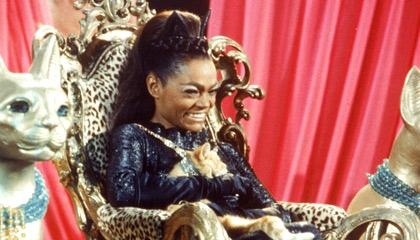I did not intend for this week to be Holes week here in my little corner of The Solute. Themes aren’t exactly new in my writing—September is Soapdish month in Celebrating the Living!—but this one was sort of organic. I watched The Defenders and thought, “Jeez, have I done Sigourney Weaver yet? She’s great!” And while writing about her, I thought, “You know, I could really talk more about Holes; it’s a pretty decent movie that doesn’t get talked about enough.” And while watching Holes, I thought, “Jeez, Eartha Kitt.” And since I can write about whoever I want for this, sure, I’ll take the progression.
It is also true that writing about Eartha Kitt allows me to talk over some broader societal themes I am fond of discussing. First, the basics—Eartha Kitt was actually her real name. Her parentage is unclear; Wikipedia actually refers to Kitt as “believing” someone to be her mother, and to this day, no one is sure who her father was. Her first sixteen years were hardscrabble, until she was accepted into the Katherine Dunham Company as a dancer and made a name for herself with her lovely and distinctive voice. She spoke four languages, sang in eleven; Orson Welles cast her as Helen of Troy in his Dr. Faustus, sparking a lifelong friendship between the two. She worked on Broadway, made an assortment of movies, was Catwoman.
American popular culture has a troubled relationship with black women’s sexuality. I’ve said for years that, when I was first coming to be aware of the word “erotic,” Eartha Kitt defined it for me—I get the Julie Newmar love, but Kitt is always my Catwoman. And I’m fine with that! Let’s be honest; Kitt herself was not averse to letting her eroticism be visible. She did deny sleeping with Orson Welles, and insisted that her relationship with James Dean was that of siblings, but you can’t purr over Adam West for five episodes and not be aware that you’re using sexuality. Or, come to that, sing “Santa Baby.”
But . . . when you look at the black women who were successful entertainers of the era, most of what you get is your Eartha Kitt types and your Hattie McDaniel types, and there’s not a lot in between. Sultry sex-kittens, you’ll pardon the expression, and mammies. Wesley Snipes as Miss Noxeema Jackson in To Wong Foo, Thanks For Everything, Julie Newmar delivers a passionate speech about Dorothy Dandridge, and she’s definitely in the Eartha Kitt camp. Lena Horne. And I’m not saying I think Eartha Kitt didn’t own her sexuality, but it was acceptable to white audiences because it was an exotic sexuality; it was Catwoman, and there’s something mysterious and dark about Catwoman even when she’s Julie Newmar.
I will still say that the thing that bothers me most about Emperor’s New Groove, a movie I mostly like, is the age-shaming of Yzma. She’s treated as vile and shriveled and scary, and part of that is that she’s an old woman. When she retrieves a dagger from a thigh sheath, there’s relief from the (younger, male) characters that she’s just going to kill them. Instead of expose them to that sexuality that was so desirable, okay, decades earlier. But it feels as though that attitude is in part because her sexuality is no longer subjugate to theirs and therefore must be disdained. It’s hard to imagine the sorts of characters played by Hattie McDaniel and Ethel Waters being allowed sexuality, and now that Kitt was older, hers went from being desirable to being repulsive.
This all gets in to why I mentally imagine some kind of wild, for rural Latvia, youth for Madame Zeroni. After all, Eartha Kitt doesn’t exactly look Latvian in the first place. I’m still thrilled she was cast in the role, as I’m mostly delighted by her turn as Yzma. But if I’m going to picture Madame Zeroni and Yzma as young women, I’m going to picture them as young women in control of their own lives; it’s about the only thing that explains how they’d be where and who they are in the first place.

